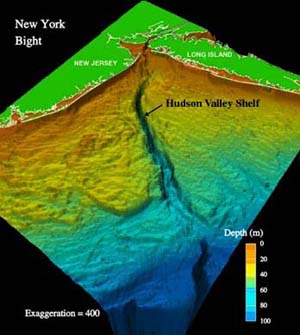Hudson Canyon
39°39′54″N 72°28′26″W / 39.665°N 72.474°W




The Hudson Canyon is a submarine canyon that begins from the shallow outlet of the estuary at the mouth of the Hudson River. It extends out over 640 km (400 mi) seaward across the continental shelf finally connecting to the deep ocean basin at a depth of 3–4 km (1.9–2.5 mi) below sea level. It begins as a natural channel of several kilometers width, starting as a 20–40 m (66–131 ft) depression at Hudson Channel southward from Ambrose Light, then carving through a deep notch of about 1 km (0.62 mi) depth in the shelf break, and running down the continental rise.[1] Tidally associated flows of about 30 cm/s (1.1 km/h) up and down the deeper parts of the canyon have been recorded. As silt, sand and mud are carried down the Hudson River, they flow into the canyon and out into the deep sea.
The Hudson Canyon proper is located about 160 km (99 mi) east of the mouth of the Hudson River off the New Jersey coast. Its walls rise 1.2 kilometres (0.75 mi) from the canyon floor, making it comparable to the Grand Canyon, whose cliffs are over 1.61 kilometres (1.00 mi) deep and 640 km (400 mi) long. It is the largest known ocean canyon off the East Coast of the United States, and one of the largest submarine canyons in the world. The canyon is located near the 100 m (330 ft) isobath on the continental shelf and is 2.2 km (1.4 mi) deep at the base of the continental slope. Over an 80 km (50 mi) distance, the average slope of the canyon floor is 1.5°. At this point the canyon is as much as 12 km (7.5 mi) wide (from east rim to west rim) and as much as 1.1 km (3,600 ft) deep from canyon rim to canyon floor across the continental slope. The floor of the canyon is less than 500 m (1,600 ft) wide across the upper part of the slope and broadens to about 900 m (3,000 ft) at the base of the slope.[2]
The canyon was last exposed during the last ice age, over 10,000 years ago, when the sea level was about 120 m (390 ft) lower and the mouth of the Hudson River was near the edge of the continental shelf, about 100 mi (160 km) east of its present site. The river discharged sediment that helped carve the canyon aided by underwater avalanches of mud and sand. Recent maps of the canyon reveal tributaries of an extraordinary underwater drainage network that is strikingly similar to terrestrial rivers. Tidal currents sweep up and down the channel; and on occasion, during big storms, cold ocean water is pushed up the Hudson Canyon to spread out on the shelf. Thus the Hudson Canyon continues to be cut by traveling sediments.[3]
"Hudson Canyon" also designates a location marked by a navigational buoy indicating the seaward end of the vessel traffic separation scheme of the Hudson Canyon–Ambrose lanes which lead into and out of New York Harbor for Atlantic shipping.
References
[edit]Citations
[edit]- ^ "NOAA Bathymetric Map". National Centers for Environmental Information. Retrieved 26 July 2024.
- ^ Butman et al. 2006, Interpretation
- ^ Butman et al. 2006
General and cited references
[edit]- Butman, Bradford; Twichell, David C.; Rona, Peter A.; Tucholke, Brian E.; Middleton, Tammie J.; Robb, James M. (2006). "Sea Floor Topography and Backscatter Intensity of the Hudson Canyon Region Offshore of New York and New Jersey: U.S. Geological Survey Open-File Report 2004-1441, CD-ROM". U.S. Geological Survey. Retrieved 26 July 2024.
